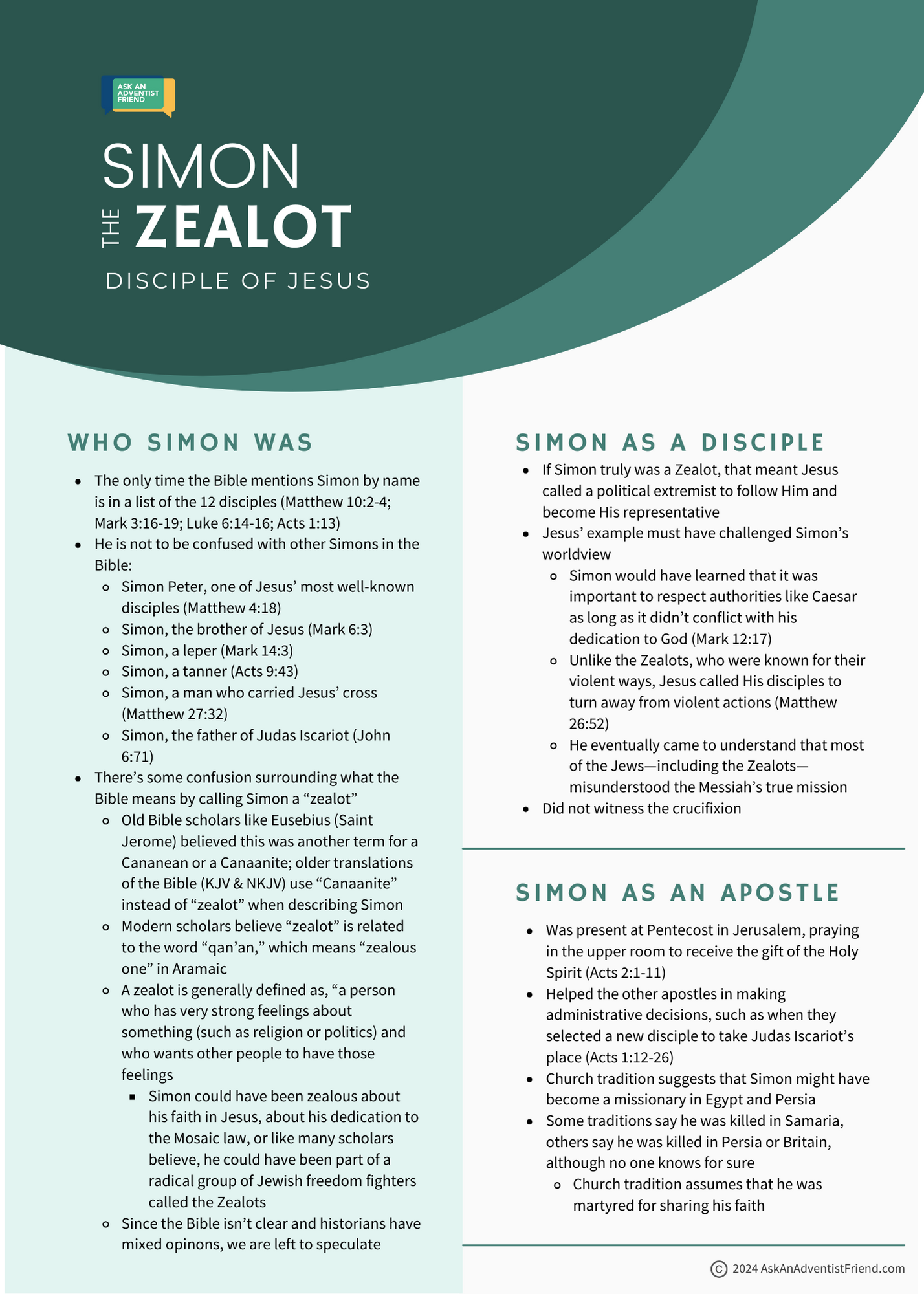All About the Disciple, Simon the Zealot
“Simon the Zealot” was one of the 12 disciples chosen by Jesus Christ.
But despite this important role, the New Testament doesn’t provide specific details about his life, family, job, etc. While being called a “zealot” might offer some insight into his character, using this description without further clarification actually leaves us with more questions than answers.
So here we will look at which details about Simon are documented, what we can infer from theories and social or historical cues, and how we can sum up his legacy as an apostle.
We’ll cover:
Let’s start with the basic background information we do know from Scripture.
Who was Simon the Zealot?

Photo by Jakob Owens on Unsplash
As we mentioned earlier, Simon the Zealot was one of Jesus’ 12 disciples.
The fact that Simon was chosen as a disciple is pretty significant on its own. Although, it’s just about the only thing the Bible tells us about him, as the Bible only mentions him by name when it lists him among the other disciples:
“The names of the twelve apostles are these: first, Simon, who is called Peter, and Andrew his brother; James the son of Zebedee, and John his brother; Philip and Bartholomew; Thomas and Matthew the tax collector; James the son of Alphaeus, and Thaddaeus; Simon the Zealot, and Judas Iscariot, who betrayed him.” (Matthew 10:2-4, ESV).
Any other ideas about this Simon come from extra-biblical sources. These sources include various stories of “church tradition,” Bible scholars, and modern media that have attempted to fill in the gaps of what we know about this mysterious figure.
One of the most recent attempts to explore the life of Simon comes from the hit series on Netflix, The Chosen.
The show explores what the Bible might have meant in calling Simon a zealot, and how Simon might have come to put his life of zealotry behind him to follow Christ. (It even goes so far as to say that Simon is related to the paralyzed man at the pool of Bethesda).
Though The Chosen’s portrayal of Simon gives us an interesting take on Simon’s struggles, the Bible doesn’t say anything about the problems he dealt with. (And it doesn’t say anything about him having a brother named Jesse either.1)
He is only ever mentioned four times. In each mention, he is only described as being one of the 12 disciples (Luke 6:12-16; Matthew 10:2-4; Mark 3:13-19; Acts 1:13).
And we want to make sure he isn’t to be confused with the other Simons of the Bible, of which there are many, including:2
- Simon Peter, one of Jesus’ most well-known disciples (Matthew 4:18)
- Simon, the brother of Jesus (Mark 6:3)
- Simon, a leper (Mark 14:3)
- Simon, a tanner (Acts 9:43)
- Simon, a man who carried Jesus’ cross (Matthew 27:32)
- Simon, the father of Judas Iscariot (John 6:71)
Alongside Jude, or Thaddeus, and James of Alphaeus, Simon the Zealot is one of the least known disciples.
But even though the Bible doesn’t tell us much about Simon, that doesn’t mean he didn’t do amazing things for Christ.
Was Simon really a zealot?
There’s some confusion surrounding what the Bible means by calling Simon a zealot.
First off, there’s some disagreement among scholars about whether Simon should be called a zealot at all.
The Gospel according to Luke uses the Greek word zēlōtēs, meaning zealot, to describe Simon.3 The Gospel accounts of Matthew and Mark, on the other hand, use the word kananaios.4
Old Bible scholars like Eusebius, otherwise known as Saint Jerome, believed this word was another term for a Cananaean or a Canaanite.5 This is why you see some of the older translations like the King James Version and the New King James Version referring to Simon as Simon the Canaanite.6
But modern scholars believe that Eusebius’ understanding of the word was actually a mistranslation.7 They believe kananaios is related to the word qan’an, which means “zealous one” in Aramaic.8 This is why a lot of newer translations refer to Simon as a zealot.9
Now, the word zealot could also refer to many different things.
The word zealot is generally defined as, “a person who has very strong feelings about something (such as religion or politics) and who wants other people to have those feelings.”10
Because the Bible doesn’t specify what Simon was zealous about, we’re left to guess.
He could have been a zealot in his dedication to follow Christ. Or he could have been like the Pharisees in his dedication to the Mosaic law.11
But, many scholars believe the use of this word suggests that Simon was actually a part of a radical group of Jewish freedom fighters called the Zealots.12
The Zealots were suspicious of any authority figure, as they saw God as their one and only ruler.13 That’s why, when the Roman Empire came along and conquered Israel, the Zealots weren’t happy. They decided to do whatever they could to undermine and resist Roman rule.
Many Jews shared the Zealots’ loathing for Roman occupation. Many of them hoped the Messiah would come to overthrow their Roman oppressors.14
But while many Jews prayed for Messianic intervention, the Zealots took their opposition to Rome to more extreme measures.
They attacked Roman officials and civilians alike. An offshoot group known as the Sicarri were even known to attack fellow Jews they suspected of being sympathetic to Rome.15
Eventually, the Zealots were able to temporarily overthrow Roman control over Jerusalem in the first Jewish revolt.16
Josephus, a Jewish historian, recorded the year the Zealots became an organized group.
Although, notably, his records do have some inconsistencies.
In one account, Josephus suggests that the Zealot movement didn’t come about until 68 AD.17
This is long after the events of the Gospel story. This suggests that Simon may not have been a part of the Zealot movement.18
However, another account by Josephus claims that the Zealots were established in 6 AD.19
Some people think Josephus claimed the Zealot movement didn’t begin until 68 AD in an attempt to downplay the movement’s power.20 This was seen as an effort to appease Roman officials.21
The fact that the Zealots could have been around in 6 AD suggests that Simon the disciple might have been a former Zealot after all.
Simon the disciple

Photo by Lukas
But back to the idea of simply being a disciple of Jesus…this alone says something about Simon.
Jesus could have chosen anyone He wanted to follow Him. He could have chosen wealthy or influential Jews, or called upon respected Jewish leaders. But Jesus, the son of God, defied human expectations.
He called upon regular, everyday fishermen (Matthew 4:18-22). He called upon a tax collector who was hated by Jewish society because he worked for the Romans (Matthew 9:9-13).
And if we are to believe Simon was truly a Zealot, He also called a political extremist to follow Him.
Though most Jews were wary of Zealots for their violent deeds and extreme stances, Jesus called Simon to follow Him and become His representative.
Jesus didn’t turn Simon away because of the group he was involved with, or for possibly having extreme tendencies.
Jesus saw Simon’s potential.
He wanted Simon to understand what it truly meant to follow God. He wanted to help him realize that the kingdom of God wasn’t built on force, but love and mercy.
We can only imagine how much Jesus’ example must have challenged Simon’s worldview.
If Simon had been a Zealot, he would have needed to put aside his old convictions and accept Jesus’ call to love everyone—even his enemies (Luke 6:27-28). (And even if he wasn’t, he, like all of the disciples, would have had to leave his old life behind to serve others and follow Jesus’ example).
Who knows…maybe Jesus intentionally placed Simon—a man who may have had a violent hatred for Rome and Roman sympathizers—in the same group as Matthew—a man who worked for Rome—to help them overcome the political boundaries keeping them from becoming the disciples Jesus knew they could be.
In his time as Jesus’ disciple, Simon would have experienced other difficult lessons.
Jesus taught Simon and the other disciples that it was important to respect authorities like Caesar as long as it didn’t conflict with their dedication to God (Mark 12:17).
Jesus also displayed kindness to Jewish enemies when He healed the servant of a Roman centurion (Luke 7:1-10).
And unlike the zealots, who were known for their violent ways, Jesus called His disciples to turn away from violent actions (Matthew 26:52).
Through these experiences, Simon eventually came to understand that most of the Jews—including the Zealots— misunderstood the Messiah’s true mission.
Jesus didn’t come to destroy the Jew’s enemies, but to save everyone from the terrible power of sin (John 10:10).
This lesson was only further driven home by the sacrifice Jesus made as He hung on the Cross, willing to die for the very people who crucified Him.
Though Simon wasn’t present for the crucifixion, He, like other disciples, would be reminded of Jesus’ true mission when the resurrected Jesus appeared to them and called them to spread the Gospel message across the world.
As Jesus returned to heaven in His ascension, He called His disciples, formerly His students, to become teachers and leaders for the early Christian church.
From there, Simon would take the lessons Jesus gave him to mature and grow into his role as an apostle.
Simon the apostle

Photo by Aaron Burden on Unsplash
While we don’t know much about the work Simon did as an individual, we do know about some of the work he did alongside the other apostles.
The Bible tells us that all the apostles were present for Pentecost in Jerusalem (Acts 2:1-11).
This means that Simon was there in the upper room, praying alongside the other apostles for the Holy Spirit to empower them to spread the Gospel.
And he, like the others, got to experience the miracle of speaking in tongues as they preached before a multitude of people.
On top of speaking to the masses, Simon and the apostles became responsible for making administrative decisions, such as when they selected a new disciple to take Judas Iscariot’s place (Acts 1:12-26).
Jesus intended the 12 apostles to become church leaders from the very beginning. In the short time He had with them, He trained them to model His character and showed them how to guide others to Him.
With those experiences, the apostles became missionaries, traveling across the world to teach people from all different walks of life about Jesus.
Scripture tells us about some of these trips. It tells us that Peter went to Samaria, Lydda, Joppa, and Caesarea to spread the message.22
Church tradition suggests that Simon might have gone to become a missionary in Egypt and Persia.23
There are also various ideas about where he died.
Some traditions say he was killed in Samaria, others say he was killed in Persia or Britain, although no one knows for sure.24
Church tradition assumes that he was martyred for sharing his faith.
One account suggests that he was sawn in half, while another says he might have been crucified.25 However, another account claims that he died of old age in Edessa.26
Whatever the case, it’s clear that Simon dedicated his life to Christ and His mission.
If Simon had really been a zealot, he certainly came a long way.
He faced the difficult challenge of learning how to put his differences aside to love, serve, and witness to people he used to consider his enemies.
Though we may not consider ourselves zealots, we all struggle at times to love those who oppose us or have different perspectives than us.
There are a lot of divisive issues in the world today. Sometimes, it can be hard to respond to people who have different opinions than us in a Christ-like manner.
But even though we don’t agree with another person’s ideas, God calls us to love and have compassion on that person, just like Jesus loved us.
Jesus says it best:
“But I say to you who hear: Love your enemies, do good to those who hate you, bless those who curse you, and pray for those who spitefully use you.” (Luke 6:27-28, NKJV).
Is this something you struggle with?
Jesus can help transform your life, just like He transformed Simon’s.
By the end of his story, Simon learned to dedicate his life to Jesus and serve the people God had called him to reach.
Want to learn about another little-known disciple?
- Keating, Kevin, “Simon the Zealot and Nathanael in The Chosen (Adapting Biblical Characters),” The Bible Artist. [↵]
- “Encyclopedia of the Bible-Simon,” Bible Gateway. [↵]
- Nelson, Ryan, “Who Was Simon the Zealot? The Beginner’s Guide,” Overview Bible. [↵]
- Ibid. [↵]
- Ibid. [↵]
- “Simon the Zealot,” Angel Studios. [↵]
- Nelson. [↵]
- Ibid. [↵]
- “Simon the Zealot,” Angel Studios. [↵]
- “Zealot,” Britannica. [↵]
- Nelson. [↵]
- Nelson. [↵]
- Nelson. [↵]
- “The Identity of Jesus,” BBC. [↵]
- “Zealot- Judaism,” Britannica. [↵]
- “First Jewish Roman Revolt,” Britannica. [↵]
- Nelson. [↵]
- Ibid. [↵]
- Ibid. [↵]
- Ibid. [↵]
- Ibid. [↵]
- Acts 8:14-24; Acts 9:32-35; Acts 9: 36- 43; Acts 10:23-48. [↵]
- “Simon the Zealot,” Angel Studios. [↵]
- Nelson. [↵]
- Ibid. [↵]
- Ibid. [↵]
Questions about Adventists? Ask here!
Find answers to your questions about Seventh-day Adventists
More Answers
Why Many Seventh-day Adventists Choose a Vegetarian Diet
Why Many Seventh-day Adventists Choose a Vegetarian Diet?You may have an Adventist friend who is vegetarian, or maybe you’re attending a Seventh-day Adventist Church for the first time and notice the potluck doesn’t have any meat. This isn’t unusual in Adventism. In...
The Health Benefits of Fresh Air You Should Know About
The Health Benefits of Fresh Air You Should Know About“When you can’t breathe, nothing else matters,” the American Lung Association tells us. And while that’s true, the kind of air you’re breathing will determine the health benefits you experience. Breathing fresh...
What Do Seventh-day Adventists Choose to Eat?
What Do Seventh-day Adventists Choose to Eat?Food blogs overwhelm the internet; food fads are all the rage; and copycat and healthy versions of food are the subject of many a get-together. Eating—and eating the best way—is a big deal. And everybody has a different...
10 Incredible Ways Sunlight Can Improve Your Health
10 Incredible Ways Sunlight Can Improve Your HealthAre you concerned about sunlight’s negative effects? You might be the one who lathers on the sunscreen and covers up when you go outside. Or maybe you avoid being outside as much as possible. You might be surprised,...
Why Is Water So Important?
Why Is Water So Important?We all know that water is a substance we can’t live without. It quenches our thirst and keeps us hydrated on the inside. And it’s necessary for hygiene and cleansing on the outside too. But did you know that the cleansing properties of water...
Ellen White’s Writings and the Adventist Health Message
Seventh-day Adventists are known for their emphasis on healthy living. And Ellen G. White was a significant influence in the development of this priority and practice among Adventists.
Health Clinics
Ellen White and Adventist Healthcare—Ahead of Their Time Medical care in the mid-1800s was primitive, to say the least. Basic concepts we take for granted—such as proper handwashing or recognizing the dangers of bloodletting—were nonexistent. And doctors often had...
What Did Ellen White Teach about Vegetarianism?
What Did Ellen White Teach about Vegetarianism?One thing you might have heard about Seventh-day Adventists is their emphasis on a vegetarian lifestyle. If you’re wondering why that is, it goes back to our church’s humble beginnings: As Adventists studied the Bible,...
How Ellen White’s Teachings Can Improve Your Health
How Ellen White’s Teachings Can Improve Your Health Healthcare in the nineteenth century was said to leave “more disease than it took away” with its use of bloodletting and “medicines” like mercury and arsenic.1 As people questioned these methods, new approaches...
Change Your Perspective on Life with These 5 Mindsets
5 Biblical Mindsets to Change Your Life for the Better Sometimes, life is just plain hard. There’s no way around it. So would thinking about things differently really change anything? Our perspective on life, and everything it throws at us, affects more than we’re...
Bible Promises for When You’re Worried or Fearful
Bible Promises for When You’re Worried or Fearful The Bible is full of beautiful promises that can comfort us in a variety of situations. They can give us hope when we are hopeless, make us feel grateful for God’s love, and comfort us when we’re grieving or suffering....
12 Practical Ways to Overcome Worry
12 Practical Ways to Overcome Worry DISCLAIMER: This content is for informational purposes only. It does not constitute any professional medical advice and is not intended as a substitute for professional mental health therapy. It’s easy to get stuck in a cycle of...
How the Bible Talks About Worry, Fear, and Anxiety
How the Bible Talks About Worry, Fear, and Anxiety Worry and fear are the ingredients of anxiety. It’s easy to see how the world isn’t perfect—and the anticipation of a bad event or experience (that may or may not even happen) can end up draining the peace and...
How to Calm Anxious Thoughts, Using the Bible
How to Calm Anxious Thoughts, Using the Bible You were expecting a phone call from your daughter half an hour ago, and she still hasn’t called. She’s also not answering your calls. You feel your heart thumping as your thoughts race: What if she’s been in a car...
What You Should Know About the Adventist Health Studies
What You Should Know About the Adventist Health StudiesYou may have heard that Seventh-day Adventists care about health. But what you may not know is that Adventists have been the subjects of long-term research into lifestyle and health. Since 1958, researchers from...
Benefits of Sunlight
Yes, There Are Health Benefits of SunlightDespite the bad reputation it’s gotten, sunlight is generally associated with positivity, as shown by songs like “You Are My Sunshine,” or phrases that refer to delightful people as having a “sunny disposition.” There’s a...
Why Your Body Needs Rest for Optimal Health
Why Your Body Needs Rest for Optimal HealthStruggling to think straight? Wondering why you can’t remember that important tidbit you heard earlier today? Feeling like your emotions are about to explode? These are just some of the symptoms that can reveal your need for...
The Seventh-day Adventist Diet: One of Our Key Longevity Secrets
The Seventh-day Adventist Diet: One of Our Key Longevity SecretsOats, avocados, lentils, tofu—probably not what you first think of in a standard American diet. But if you show up at the home of an Adventist, chances are you may be served one of these staples. Out of a...
Why You Need Fresh Air
Why You Need Fresh Air“When you can’t breathe, nothing else matters,” the American Lung Association tells us. We couldn’t agree more! Breathing in clean air is an essential part of caring for our bodies, which God has given us. Together with other health principles,...
Sabbath Meal
Everything You Need to Know About Sabbath MealsFor Seventh-day Adventists, sharing a Sabbath meal with friends and family is one of the most special and memorable parts of the Sabbath. That’s why we want to share with you all about Sabbath meals and why they’re such a...
Adventists and Healthy Living
Adventists and Healthy LivingWhat’s the Adventist “Health Message” All About? One thing Seventh-day Adventists are known for is their emphasis on living healthy lives. Since our bodies are living temples of the Holy Spirit (1 Corinthians 6:19, 20), we strive to stay...
Water’s Importance—Physical Benefits and Spiritual Applications
Water’s Importance—Physical Benefits and Spiritual Applications We all know that water is a substance we can’t live without. Not only does it quench our thirst and keep us hydrated from the inside, but it’s necessary for hygiene and cleansing on the outside as well....
How Important is a “Day of Rest?”
How Important is a “Day of Rest?” Why God Created a Day for Downtime by Martin Casper Do you ever experience the feeling of complete overload? Do you feel like the only way you can get ahead is by slamming it 24/7? I hear these types of comments more and more...
7 Reasons Why a Day of Rest is Important
7 Reasons Why a Day of Rest is ImportantWe live in a fast-paced world. It seems as if success is measured in how much you can do in a short amount of time. (Extra points for the service or product that is available 24/7). The idea that we will be more successful if we...
How do Adventists choose what to eat?
How do Adventists choose what to eat?Every day, parents go through the ritual of getting their kids to eat what is healthy and good while trying to steer them away from what can hinder the growth of their developing bodies. Nutritionists work with their clients to...
How Can I Have a Better Marriage?
Is it possible to have a happy marriage?
Why are many Adventists Vegetarian?
Why are many Adventists Vegetarian?The diet intended for man is outlined in Genesis 1:29, “And God said, ‘See, I have given you every herb that yields seed which is on the face of all the earth, and every tree whose fruit yields seed; to you it shall be for food.’”...
Didn’t find your answer? Ask us!
We understand your concern of having questions but not knowing who to ask—we’ve felt it ourselves. When you’re ready to learn more about Adventists, send us a question! We know a thing or two about Adventists.






















